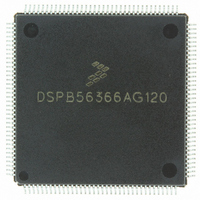DSPB56366AG120 Freescale Semiconductor, DSPB56366AG120 Datasheet - Page 101

DSPB56366AG120
Manufacturer Part Number
DSPB56366AG120
Description
IC DSP 24BIT AUD 120MHZ 144-LQFP
Manufacturer
Freescale Semiconductor
Series
Symphony™r
Type
Audio Processorr
Datasheet
1.DSPB56366AG120.pdf
(110 pages)
Specifications of DSPB56366AG120
Interface
Host Interface, I²C, SAI, SPI
Clock Rate
120MHz
Non-volatile Memory
ROM (240 kB)
On-chip Ram
69kB
Voltage - I/o
3.30V
Voltage - Core
3.30V
Operating Temperature
-40°C ~ 110°C
Mounting Type
Surface Mount
Package / Case
144-LQFP
Lead Free Status / RoHS Status
Lead free / RoHS Compliant
Available stocks
Company
Part Number
Manufacturer
Quantity
Price
Company:
Part Number:
DSPB56366AG120
Manufacturer:
TOSHIBA
Quantity:
639
Company:
Part Number:
DSPB56366AG120
Manufacturer:
FREESCAL
Quantity:
273
Company:
Part Number:
DSPB56366AG120
Manufacturer:
Freescale Semiconductor
Quantity:
10 000
5.5
Careful synchronization is required when reading multi-bit registers that are written by another
asynchronous system. This synchronization is a common problem when two asynchronous systems are
connected, as they are in the host interface. The following paragraphs present considerations for proper
operation.
5.5.1
Freescale Semiconductor
•
•
•
•
•
•
Unsynchronized Reading of Receive Byte Registers—When reading the receive byte registers,
receive register high (RXH), receive register middle (RXM), or receive register low (RXL), the
host interface programmer should use interrupts or poll the receive register data full (RXDF) flag
that indicates whether data is available. This ensures that the data in the receive byte registers will
be valid.
Overwriting Transmit Byte Registers—The host interface programmer should not write to the
transmit byte registers, transmit register high (TXH), transmit register middle (TXM), or transmit
register low (TXL), unless the transmit register data empty (TXDE) bit is set, indicating that the
transmit byte registers are empty. This ensures that the transmit byte registers will transfer valid
data to the host receive (HRX) register.
Synchronization of Status Bits from DSP to Host—HC, HOREQ, DMA, HF3, HF2, TRDY,
TXDE, and RXDF status bits are set or cleared from inside the DSP and read by the host processor
(refer to the user’s manual for descriptions of these status bits). The host can read these status bits
very quickly without regard to the clock rate used by the DSP, but the state of the bit could be
changing during the read operation. This is not generally a system problem, because the bit will be read
correctly in the next pass of any host polling routine.
However, if the host asserts HEN for more than timing number 31, with
a minimum cycle time of timing number 31 + 32, then these status bits are guaranteed to be
stable. Exercise care when reading status bits HF3 and HF2 as an encoded pair. If the DSP
changes HF3 and HF2 from 00 to 11, there is a small probability that the host could read the bits
during the transition and receive 01 or 10 instead of 11. If the combination of HF3 and HF2 has
significance, the host could read the wrong combination. Therefore, read the bits twice and
check for consensus.
Overwriting the Host Vector—The host interface programmer should change the host vector
(HV) register only when the host command (HC) bit is clear. This ensures that the DSP interrupt
control logic will receive a stable vector.
Cancelling a Pending Host Command Exception—The host processor may elect to clear the HC
bit to cancel the host command exception request at any time before it is recognized by the DSP.
Because the host does not know exactly when the exception will be recognized (due to exception
processing synchronization and pipeline delays), the DSP may execute the host command
exception after the HC bit is cleared. For these reasons, the HV bits must not be changed at the
same time that the HC bit is cleared.
Variance in the Host Interface Timing—The host interface (HDI) may vary (e.g. due to the PLL
lock time at reset). Therefore, a host which attempts to load (bootstrap) the DSP should first make
Host Port Considerations
Host Programming Considerations
DSP56366 Technical Data, Rev. 3.1
5-5











